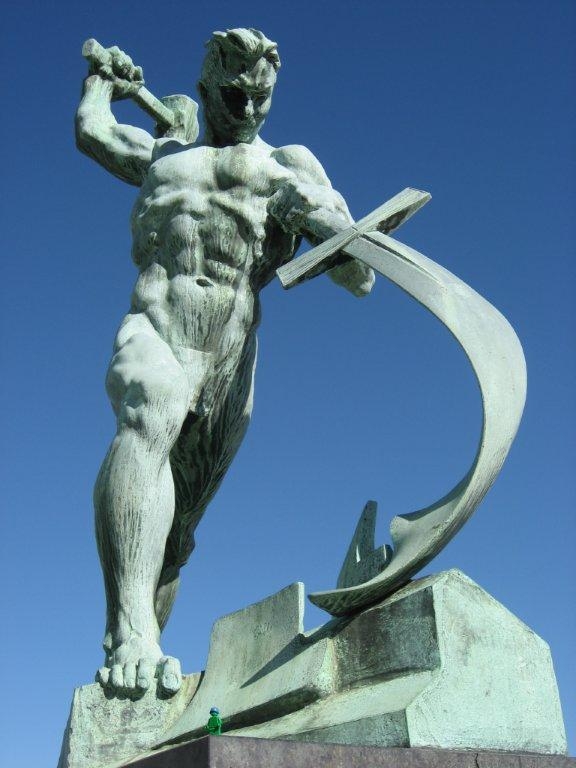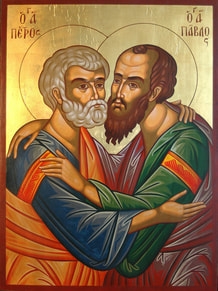These reflections are a result of more than 40 years of ministry as a Roman Catholic priest. Most of these years I spent in the Diocese of Charlotte which covers Western North Carolina. Now I am retired, and live in Medellín, Colombia where I continue to serve as a priest in the Archdiocese of Medellín.

Then the wolf shall be a guest of the lamb, and the leopard shall lie down with the kid; The calf and the young lion shall browse together, with a little child to guide them.
The cow and the bear shall be neighbors, together their young shall rest; the lion shall eat hay like the ox. The baby shall play by the cobra's den, and the child lay his hand on the adder's lair. There shall be no harm or ruin on all my holy mountain; for the earth shall be filled with knowledge of the LORD, as water covers the sea. (Is 11:1-10)
https://bible.usccb.org/bible/readings/120523.cfm
The image of the Peaceable Kingdom invites us to dare to dream and to work for the reconciliation of humanity with itself and then with all creation. Come, Lord Jesus, come, do not delay!

They shall beat their swords into plowshares and their spears into pruning hooks; One nation shall not raise the sword against another, nor shall they train for war again. O house of Jacob, come, let us walk in the light of the LORD! (Is 2:1-5)
https://bible.usccb.org/bible/readings/120423.cfm
The vision of the old prophet Isaiah—swords into plowshares, spears into pruning hooks, no more war, no more training for war—is it just a pipe dream? Or is God serious? If God is serious, that would mean no more soldiering, no more weapons sales. Of course, the God who comes is dead serious, perhaps it would be better if we paid attention: “Come, let us walk in the light of the Lord!”

No ear has ever heard, no eye ever seen, any God but you doing such deeds for those who wait for him. (Is 63:16-17, 19;64:2-7)
https://bible.usccb.org/bible/readings/120323.cfm
Advent is a time of joyful waiting. We wait in hope for the Coming of the Lord and the fulfillment of the promise: a new heaven, and a new earth, and a brand new us. We long for the Advent graces: Hope, Peace, Joy and Love. Come, Lord Jesus, come, do not delay!

'Well done, my good and faithful servant . . . Come, share your master's joy.’ (Mt 25:14-30)
https://bible.usccb.org/bible/readings/111923.cfm
Today I think about the many wonderful priests in my Diocese of Charlotte who touched my life and have now gone before us: Fr Wil Thomas, Msgr Tony Kovacic, Fr Frank Connolly, Msgr Bill Pharr, Msgr Frank Smith, Fr Tom Clements, Fr Jim Cahill, Fr Bill Evans, Fr Ed Beatty, Fr Joe Kerin, Msgr Dick Allen, Fr Tom Walsh, Fr George Kloster, Msgr Rich Bellow, and Fr Joe Waters. Well done, good and faithful servants! After today the Daily Reflection and the "Mass in Spanish with a Little Bit of English" go on vacation until the First Sunday of Advent. Happy Thanksgiving!

When peaceful stillness compassed everything and the night in its swift course was half spent, Your all-powerful word, from heaven’s royal throne bounded, a fierce warrior, into the doomed land, bearing the sharp sword of your inexorable decree. (Wis 18: 14-16; 19:6-9)
https://bible.usccb.org/bible/readings/111823.cfm
This passage from the Book of Wisdom influenced the Christmas traditions more than we realize. The famous carol and Marian hymn, Lo How a Rose E’er Blooming (in German, "Es ist ein Ros entsprungen”), as well as the Christmas tradition of Midnight Mass comes from this passage: when half-spent was the night. Today is also the dedication of two of the major basilicas of Rome, the Vatican Basilica of Saint Peter and the Basilica of Saint Paul Outside the Walls, honoring the two apostles of Rome.



